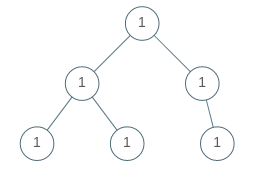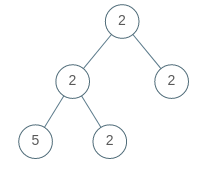https://leetcode.com/problems/univalued-binary-tree/


https://leetcode.com/problems/univalued-binary-tree/discuss/211190/JavaC%2B%2BPython-Straight-Forward
https://leetcode.com/problems/univalued-binary-tree/discuss/211397/Java-9-and-4-liners-Iterative-and-recursive-versions.
A binary tree is univalued if every node in the tree has the same value.
Return
true if and only if the given tree is univalued.
Example 1:

Input: [1,1,1,1,1,null,1] Output: true
Example 2:

Input: [2,2,2,5,2] Output: false
Note:
- The number of nodes in the given tree will be in the range
[1, 100]. - Each node's value will be an integer in the range
[0, 99]
https://leetcode.com/problems/univalued-binary-tree/discuss/211190/JavaC%2B%2BPython-Straight-Forward
A tree is univalued if both its children are univalued, plus the root node has the same value as the child nodes.
We can write our function recursively.
left_correct will represent that the left child is correct: ie., that it is univalued, and the root value is equal to the left child's value. right_correct will represent the same thing for the right child. We need both of these properties to be true.
public boolean isUnivalTree(TreeNode root) {
boolean left_correct = (root.left == null || (root.val == root.left.val && isUnivalTree(root.left)));
boolean right_correct = (root.right == null || (root.val == root.right.val && isUnivalTree(root.right)));
return left_correct && right_correct;
}
https://leetcode.com/problems/univalued-binary-tree/discuss/211397/Java-9-and-4-liners-Iterative-and-recursive-versions.
Iterative version - BFS.
Analysis: Time & space: O(n).
public boolean isUnivalTree(TreeNode root) {
Queue<TreeNode> q = new LinkedList<>();
q.offer(root);
while (!q.isEmpty()) {
TreeNode n = q.poll();
if (n.val != root.val) { return false; }
if (n.left != null) { q.offer(n.left); }
if (n.right != null) { q.offer(n.right); }
}
return true;
}
Recursive version - DFS.
Analysis: Time & space: O(n).
public boolean isUnivalTree(TreeNode root) {
return dfs(root, root.val);
}
private boolean dfs(TreeNode n, int v) {
if (n == null) { return true; }
if (n.val != v) { return false; }
return dfs(n.left, v) && dfs(n.right, v);
}
Q & A
Q:
What if the root is null?
Q:
What if the root is null?
A:
We can add the following statement as the first line in isUnivalTree(TreeNode) for both method 1 & 2:
We can add the following statement as the first line in isUnivalTree(TreeNode) for both method 1 & 2:
if (root == null) return true;
In fact, the problem description states "The number of nodes in the given tree will be in the range [1, 100].", which implies
https://leetcode.com/problems/univalued-binary-tree/discuss/211191/C%2B%2BJava-one-linerroot != null.boolean dfs(TreeNode r, int v) {
return r == null || (r.val == v && dfs(r.left, v) && dfs(r.right, v));
}
public boolean isUnivalTree(TreeNode r) { return dfs(r, r.val); }
List<Integer> vals;
public boolean isUnivalTree(TreeNode root) {
vals = new ArrayList();
dfs(root);
for (int v : vals)
if (v != vals.get(0))
return false;
return true;
}
public void dfs(TreeNode node) {
if (node != null) {
vals.add(node.val);
dfs(node.left);
dfs(node.right);
}
}